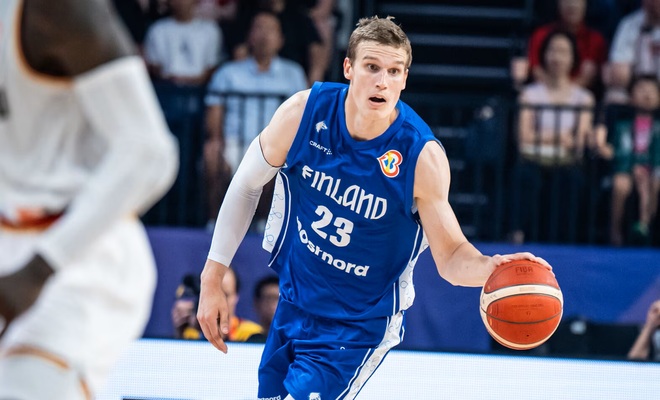-
 September 6, 2025, 5:43 pm
September 6, 2025, 5:43 pmLast Updated on September 6, 2025 5:53 pm by André Lemos | Published: September 6, 2025
Turkey 85, Sweden 79
Sweden came into this Round of 16 clash with clarity and confidence, executing their offense with discipline in the first half. They attacked the rim, shared the ball and found good looks, while also limiting Alperen Sengun’s playmaking opportunities by crowding the paint. Cedi Osman carried Turkey early with 11 points in under 9 minutes, but foul trouble kept him on the bench. Sweden’s deliberate approach, led by Simon Birgander’s interior presence and Pelle Larsson’s steady guard play, earned them a 42–37 halftime lead.
Turkey came out of the locker room with urgency, but their offense was initially rushed and stagnant. The shift came when they cranked up the defensive pressure, forcing Sweden into turnovers and disrupting their rhythm. A key tactical adjustment, using Ercan Osmani as a passer to feed the post, helped free Sengun from Sweden’s traps. That opened the door for a 14-0 surge that flipped the game, capped by an Osmani corner three that put Turkey in front. By the end of the third, Sengun had fully grown into the role of offensive hub, controlling the glass and creating second-chance opportunities.
The fourth quarter was a battle. Sweden’s cutting and ball movement kept producing easy looks, Hakanson and Larsson hit timely shots to tie the game multiple times. Birgander, even while managing foul trouble, was immense with blocks, rebounds and effort plays. But Sengun answered every challenge, tipping in misses, drawing attention in the post and even delivering a late block that turned into a transition score. With Shane Larkin steady in the closing possessions adding key free throws, Turkey finally held off Sweden’s push.
Sengun was the difference, finishing with 24 points, 16 rebounds, and 6 assists in 35 minutes, showing both endurance and poise. Turkey’s rebounding edge (45–33, including 18 offensive boards) and 16 second-chance points were decisive against a Swedish team that shared the ball beautifully (22 assists) but couldn’t overcome foul trouble and lapses under pressure.
Sweden left the tournament with their style on full display, five players in double figures, constant movement and a fearless approach, but it was Turkey’s interior strength and Sengun’s takeover that pushed them back into the EuroBasket Quarter-Finals for the first time since 2009.
Germany 85, Portugal 58
Portugal came out fearless, opening on a 7–2 run as Neemias Queta stepped out to drain a three and the team pushed the pace in transition. Germany’s plan was clear: stretch the floor with Daniel Theis to pull Queta out of the paint. But with both teams starting ice cold from deep (1-for-10 apiece), the game quickly became a grind.
Portugal looked the sharper side early, stringing together a 12–4 run through stagger actions and disciplined defense, while Germany’s wings were too much of a mismatch for the smaller Portuguese perimeter. Queta anchored things inside and by halftime Germany was stuck at just 31 points, shooting 1-for-17 from three. Portugal’s second unit carried their weight as well, outscoring Germany’s bench 17–5 by the end of the third quarter.
Germany tried to crank up the pressure with high hedges in pick-and-roll coverage, but Portugal’s guards consistently found Queta on the roll or via lob. It wasn’t until the fourth that the tide turned. Maodo Lo finally broke Germany’s drought with back-to-back threes, sparking a run Portugal couldn’t answer. Fatigue and lack of shot creation showed for the underdogs, as they shot just 3-for-17 in the final quarter and committed a rash of turnovers.
Germany, still cold from deep overall (10-for-36), leaned on their size, defense and late shot-making. Lo’s threes opened the floodgates, Franz Wagner brought steady all-around impact, as the bench finally came alive with 25 points late in the second half after being invisible for three quarters.
Queta’s 18 points and 11 rebounds highlighted Portugal’s fight and their defensive switching ability kept them in the game until late. But Germany’s depth, physicality and ability to finally string together outside shots proved decisive, as the reigning world champions turned a scare into a comfortable win to reach their third straight EuroBasket Quarterfinal.
Lithuania 88, Latvia 79
The Baltic derby delivered the intensity everyone expected, but Lithuania were sharper from the opening tip and never trailed on their way to the Quarter-Finals. Both teams came out firing, Lithuania hit their first three threes, Latvia knocked down two of their first three, but Lithuania’s defensive scheme on Kristaps Porziņģis set the tone. By switching everything onto him, they disrupted his rhythm early and with Jonas Valančiūnas starting the game on the bench, Lithuania kept their coverages mobile. When rotations broke down, Porziņģis did find looks, but overall Latvia were pushed into late-clock situations and poor two-point shooting (2-for-8 in the first quarter).
On the other end, Lithuania leaned on Arnas Velička to fill Rokas Jokubaitis’ role, and he delivered with rim pressure, playmaking, and composure. Deividas Sirvydis brought energy defensively and timely shooting, helping Lithuania hold their edge while Latvia opened the second quarter with a 6-0 burst. Still, Latvia’s offense never flowed the way it usually does, their trademark off-ball movement was absent, largely due to Lithuania’s physical defense.
Valančiūnas was used in short, targeted stretches, bringing power inside when Lithuania needed it. By the end of the third, he had only nine minutes but provided a momentum play with an and-one at the shot clock buzzer that pushed the gap back into double digits. Latvia, meanwhile, leaned heavily on Porziņģis, who carried their scoring load but often stood alone in terms of energy and efficiency.
The fourth quarter brought heavy pressure. Lithuania went 0-for-5 from deep, while Latvia cranked up a full-court 2-2-1 zone press before switching to intense half-court man-to-man defense to force mistakes. The hosts clawed back within seven with three minutes left, but lapses, including a turnover immediately after a drawn-up sideline play, undercut their push. Lithuania’s discipline inside proved decisive, with 40 points in the paint compared to Latvia’s 28, while Velička and Ažuolas Tubelis made big late buckets to close it out.
Porziņģis’ 34 points and 19 rebounds gave hope to Latvia, but Lithuania’s balance and defensive edge carried them through. Velička’s 21 points, 12 assists and 5 rebounds made him the game’s quiet star, seamlessly stepping into Jokubaitis’ shoes and guiding Lithuania back to the EuroBasket Quarter-Finals for the first time since 2015.
Finland 92, Serbia 86
Finland delivered the shock of the Round of 16 by outlasting Serbia, and they did it their way, fast, fearless and firing from deep. The Susijengi opened with six threes in the first quarter, using the mobility of Lauri Markkanen and Mikael Jantunen to pull Serbia’s frontcourt into space. Serbia switched nearly everything, but those switches only created mismatches Finland was happy to hunt.
The second quarter swung the other way. Finland’s defense slipped, their shot selection leaned too heavily on threes, and they went scoreless for stretches. Serbia’s size with Nikola Milutinov and Nikola Jokić began to tell, racking up paint points. Finland struggled most in the minutes without Little, when their lack of a true playmaking guard showed. A Jokić technical briefly gave Finland a spark, and with turnovers feeding their transition game, Markkanen began to take over, already up to 14 points by halftime despite Serbia’s edge inside.
Serbia’s adjustments out of the break put the ball more often in Nikola Jović’s hands, and he made them pay with perimeter shot-making. But when Jokić picked up his third foul early, Finland smelled opportunity. They pressed, ran, and threw bodies at Jokić to force him away from his comfort zones. Sasu Salin found his rhythm from three and the Finns leaned into a simple formula: defend hard, shoot threes, foul Jokić if necessary. Jokić spent plenty of time at the free-throw line, though he missed several, keeping alive the idea of fouling him if necessary.
The fourth quarter brought both drama and resilience. Markkanen took a knock to his knee and wasn’t at full capacity, forcing others to step forward. Miro Muuriinen sparked Finland with energy, and Elias Valtonen, who Serbia had stashed Jokić on defensively, turned that matchup into gold. Exploiting Jokić’s slow closeouts, Valtonen came up huge in crunch time, attacking off the dribble and knocking down two big threes along with a pair of layups.
While Serbia relied almost exclusively on Jokić (33 points) and Jović (20), their late-game execution faltered. Instead of riding Jokić inside, possessions drifted to secondary creators. Marko Gudurić couldn’t deliver and without Bogdan Bogdanović, Serbia lacked a perimeter closer.
Finland, meanwhile, leaned on their depth and hustle, 20 offensive rebounds, transition pressure, and just enough timely shot-making. Markkanen’s 29 points set the tone, but it was Valtonen’s clutch buckets and Finland’s collective commitment to make Jokić work alone that sealed one of EuroBasket’s biggest upsets in years.
This article was written by the European Hoops team: Tiago Cordeiro, João Caeiro, Diogo Valente and André Lemos. Make sure you give us a follow on Twitter at @EthosEuroleague!
